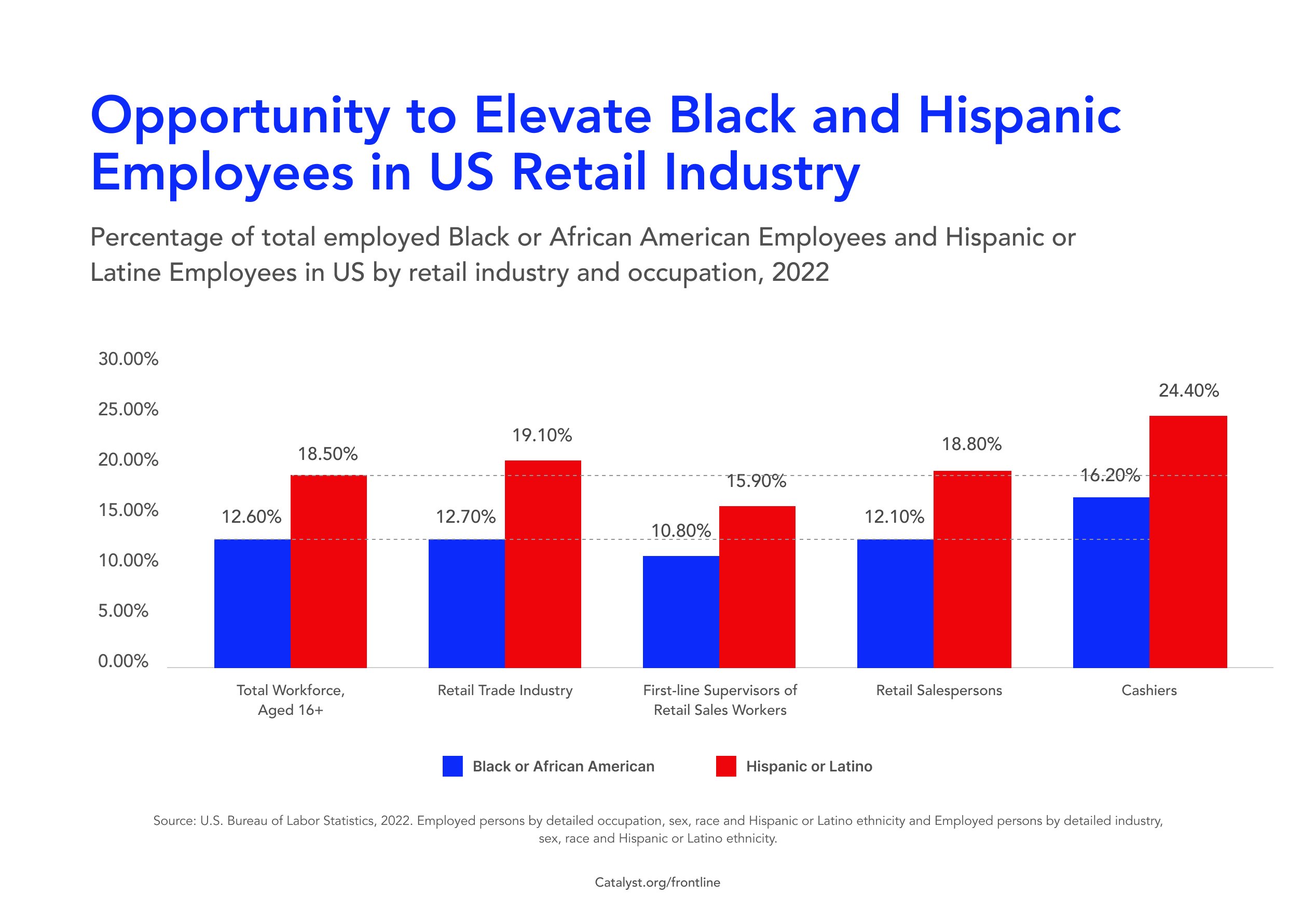Retaining Frontline Retail Talent: Focus on Caregivers, People from Marginalized Racial and Ethnic Groups, and Gen Z
As retailers enter the holiday crush, employees become even more vital to being able to deliver a positive customer experience and successful sales season. Chief Human Resources Officers looking to prioritize talent can double-down on improving conditions for caregivers, people from marginalized racial and ethnic groups, and members of Gen Z—who represent significant communities within the retail frontline workforce.
1. Caregivers
Women, who often are primarily responsible for caregiving duties, make up the majority of cashier (72%) roles and nearly half of first-line supervisor of retail sales (45.2%) positions.
A recent report from Catalyst in partnership with Accenture, Women on the Front Line: Enabling Them to Thrive, Stay and Perform, identified inflexible scheduling practices as a major issue for caregivers, which in turn impacts children, partners, and extended families.
“The assistant managers and store manager are scheduled 50 hours a week, and a lot of the [employees] who are under us…don’t wanna promote because they don’t wanna work 50, 60 hours a week. It’s not appealing for them to be in management because we’re scheduled so many hours and myself, I’m a single mom. I take care of my elderly mother. I have three dogs; 50 hours is a rough amount of time.” —Pacific Islander Asian woman, 40, retail manager
Recommendations include guaranteed minimum hours, more predictable shifts, aligning with childcare availability, and policies supporting caregiving responsibilities. The advantage? Companies that improve caregiving benefits and scheduling practices could reduce attrition. Across industries, four in 10 (44%) women say they will likely need to change jobs to balance childcare with work demands, as well as 37% of men, according to a 2023 survey conducted by The Harris Poll, commissioned by Catalyst.
2. Black/African American and Hispanic/Latine
Compared to the total workforce, Black/African American employees and Hispanic/Latine employees are overrepresented in the retail industry in cashier and sales roles but underrepresented as supervisors. (See chart.) For example, Black or African American people make up 12.6% of the total workforce aged 16+ but make up 16.2% of cashiers and only 10.8% of first-line supervisors of retail sales workers.

Source: US Bureau of Labor Statistics, 2022. Employed persons by detailed occupation, sex, race and Hispanic or Latino ethnicity and Employed persons by detailed industry, sex, race and Hispanic or Latino ethnicity.
According to McKinsey’s research on racial disparities in frontline workplaces, “Three of four frontline workers want to be promoted, but less than one in four achieves it,” with workers of color facing biases and stereotypes that act as barriers. These data points signal an opening for retailers to investigate their career development systems for root causes of growth ceilings.
Catalyst’s research on women in frontline roles found that companies have an opportunity to clarify career paths and address perceptions that higher-level jobs are less flexible and lucrative. Companies can promote inclusion by reviewing compensation and promotion data, rethinking qualifications, outlining and communicating clear growth plans, and training managers and staff on advancement processes.
“Promoting [from] within. I feel like that’s the best way…’cause I work[ed] different jobs and cashier to entry level to management.…So I just feel like if you already have a person that’s working in your company, no matter the store level or corporate, you could be a janitor. I just feel like you should give everybody the chance…I feel like that’s how you miss a lot of great candidates. By just overlooking them…. That’s the…main mistake because most people have the experience, they [are] just overlooked.” —Black/African American woman, 32, retail employee
3. Generation Z
To win the talent race, retailers must reimagine their work cultures to include the racially and ethnically diverse Generation Z, which the Deloitte Global 2022 Gen Z and Millennial Survey defines as people born between 1995 and 2003.
According to the survey, nearly half (48%) of Generation Z respondents said they plan to leave the retail industry within two years. According to the survey, members of this generation are suffering from burnout and seeking employers that offer work-life balance, invest in their development, and align with their values.
Improving scheduling and career growth can help, but a true culture shift requires empathic management. Training on diversity, empathy, and openness can help managers create supportive environments critical for Gen Z retention.
By creating a more inclusive, flexible, and meaningful work environment for these three groups, retailers can create cultures that attract more talent and better support the important employees who keep their businesses running.
Catalyst Supporters can learn more about attracting and retaining frontline talent by accessing free tools for frontline managers, Moments That Matter, and organizational leaders, Window to the Front Line.
Not a Catalyst Supporter?
Fill out the form to receive an exclusive excerpt of Window to the Front Line with recommendations for organizational leaders.